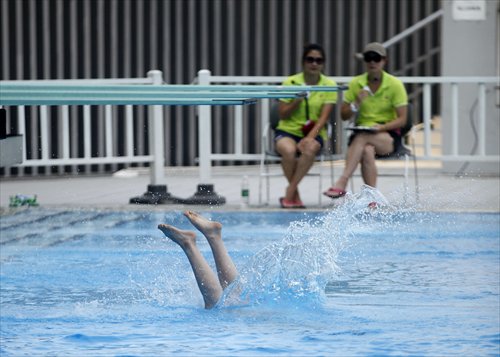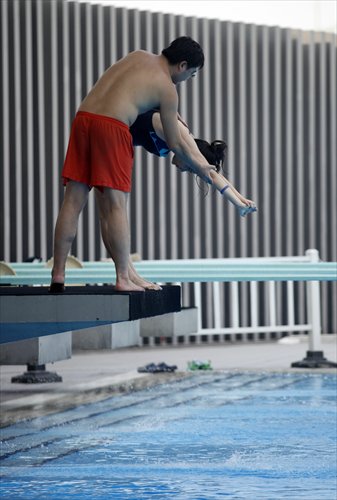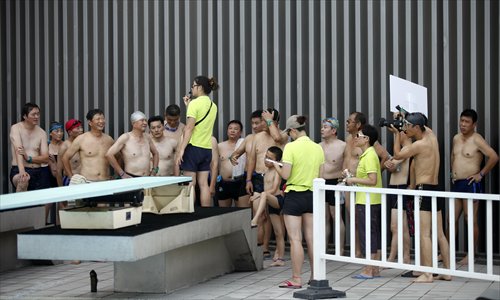HOME >> CHINA, METRO SHANGHAI
Amateur contest makes a splash
By Wang Zhefeng Source:Global Times Published: 2014-9-9 19:18:01
Once restricted to professionals, diving comes to the masses

Two referees watch the diving competition. Photo: Global Times
Five, 5 and 5.8: these were my final scores in this year's amateur diving competition organized by the Shanghai Sports Federation and the Shanghai General Labor Union. Even though I was short of the highest mark - 10 - like many others who took part in the recently concluded contest, I felt a sense of pride in what I'd accomplished.
Historically, few ordinary people have gotten involved with diving in China. Even in Shanghai, with its relatively advanced water sports infrastructure, few swimming pools are equipped with diving boards and most facilities forbid people from diving. Consequently, few have the skills or the courage needed to take even a modest plunge - let alone leap from a diving board several meters in the air.
Last year, sports authorities in Shanghai decided to change all this and organized the city's first-ever amateur diving contest. In its inaugural year, some 600 ordinary citizens turned out to participate. This year, organizers say the figure climbed to 1,011 - including 628 men and 383 women. After three rounds, 30 men and 10 women made their way to the event's final round of competition Sunday. Most of those who made it to the final selection participated last year, and most also say their scores improved this time around.
As a reporter and an avid admirer of the sport of diving, I decided to jump into the water myself in order to get a new perspective on this contest. Falling through the air, I wanted to experience the sensation of hitting the water. I also wanted to come closer to core principle of the sport: control.

A contestant trains at the Shanghai Oriental Sports Center. Photo: Global Times
Sporting life
For several decades, the government's sports development policies have focused on cultivating professional teams and supporting the most promising athletes. The aim of this was to raise the country's stature at international sporting events such as the Olympic Games. Recently though, authorities have begun to emphasize the importance of sports among ordinary citizens.
Today in Shanghai, the local sports bureau organizes amateur football, basketball, badminton, swimming and dragon boat racing leagues. Of course, ordinary folk can also get their feet wet with diving as well.
The application process for the city's diving competition started in early July, with preliminary swimming and diving skills tests taking place on weekends. Overall, the competition was broken into three rounds - preliminary testing, a breakthrough round and finals - with competition getting more intense with each stage.
Wrong preparation
The event's preliminary round was designed to test basic swimming abilities, with each participant being required to swim 8 meters under water without coming up for air.
Like many others, I'm used to swimming with goggles and a swimming cap. For divers though, such equipment should be left at home.
"When you dive, you should not wear goggles and caps, because the impact from jumping into the water may shatter the goggles and rip off the caps. You should get accustomed to swimming without them during the first swimming tests," said our team leader.
Of course, many of those who showed up for the first round had never dived before in their lives. I wasn't the only one who wasn't properly prepared. One girl in our group had even made the mistake of wearing a bikini. She quit after an explanation of what might happen to her outfit once she hit the water.
"When you enter the water, you need to hold your breath for several seconds, so swimming for 8 meters under water will ensure you are qualified," our leader said. Over the course of the proceedings, this was just one of the several occasions when he emphasized that safety was the most important aspect of the competition.
One by one, each person jumped into the water and swam. Unfortunately, several would-be competitors were eliminated. "Although I'm a good swimmer, I'm not accustomed to holding my breath," said one person who was cut from the contest.
Those who passed the swimming test - I was in this group - were taken to a real diving pool. There, a professional diver demonstrated two standard diving poses from a 1-meter board - headfirst and feetfirst.
Since the contest was aimed at novices, technical tumbles and midair contortions were not required. Indeed, according to Zhang Shufang, one of the referees at the contest, it is extremely difficult for adults who have not received training from an early age to pull off the sorts of complex dives that professionals perform. Instead, the amateur divers would be judged on how well they could control their bodies.

Team leaders remind contestants that safety is the most important aspect of the competition. Photo: Global Times
Body control
For beginners, the simple diving poses looked easy enough. Both seemed to require little more than holding one's body stiff and straight. But looks were deceiving when it came time to perform. During the second or so we spent in the air, few found it easy to gain mastery over their positions.
"It's so quick. My brain was a blank when I jumped so it's impossible for me to think," one contestant, Li Lei, explained. Specifically, Li said she kept forgetting to keep her legs closed during the headfirst dives.
After a few jumps on the one-meter platform, I was upgraded to the 3-meter platform. Unfortunately, I hurt my back during a headfirst leap; the consequence of not holding my body straight. The injury was not serious, but nevertheless it brought home the difficulties - and dangers - of diving. A few weeks later, I was able to advance to the next stage of the contest: the breakthrough round.
Practice makes perfect
In all, some 200 people went on the second stage of the contest. Like the others who moved ahead, my own performance improved with each dive. After a while, it became possible for me to control my posture even as I plummeted toward the water below.
During this second round, the best divers came to the surface. Some received scores of 8 or 9 from judges. These elites sailed through the air with confidence and their bodies sliced into the water like knives. Incidentally, my own scores of 5, 5 and 5.8 were too low to advance to the final showdown.
"The best scorers all attended the competition last year and then trained at a diving club, that's why they did much better than us," said Fu Yilan, a contestant.
Xu Wei was one of the highest scorers during the second round. He echoed Fu's statements and said that the best performers had joined a diving club last year after the first diving contest. "Practice makes perfect," said Xu. "This holds true even in amateur competitions."
Xu was among 30 men and 10 women who took part in the final competition. In the end, a 7-year-old girl named Lu Tianxi became the women's champion, while Cao Yiwei came out on top among the men. Both had been training since last year's contest.
Looking ahead
Referee Zhang, a former professional diver and coach, is happy to see diving being promoted to ordinary Chinese people. In the past, only those being groomed from a young age into professional athletes took part in diving. Now she says the sport is becoming more open and popular.
Chen Yin, a 59-year-old female contestant, explained that when she was a kid, people often dived in the Suzhou Creek. For many of the city's older residents, such experiences were their only exposure to diving. "At that time, in the summer, many people jumped from the bridge to compete. It wasn't safe but we enjoyed it," Chen said. Later, city authorities forbid such activities, she went on to mention.
But with local rivers off limits, there were few other places where people in Shanghai could dive for fun or competition - at least until last year.
With the number of participants growing over the past year, many of those who took part in Shanghai's second amateur diving contest are looking forward to another exciting contest next year. For them, the next 12 months will offer a chance to hone their skills and perfect their performances - until it comes time to take the plunge next year.
Posted in: Society, Metro Shanghai, City Panorama